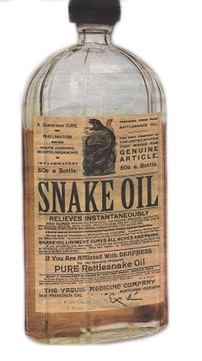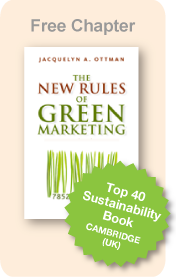Jacquie Ottman's
Green Marketing Blog
What Greenwash Can Learn from Snake Oil
June 13, 2011 by Jacquelyn Ottman & Mark Eisen
 If we treat greenwash, we’re treating a symptom. We’re not finding and treating the problem, if indeed there is one, at least to the extent the hype would lead one to believe. We have to realize that first, the definition of greenwash is to be intentionally misleading. We don’t think that’s the case today, except in limited instances. Some history is in order.
If we treat greenwash, we’re treating a symptom. We’re not finding and treating the problem, if indeed there is one, at least to the extent the hype would lead one to believe. We have to realize that first, the definition of greenwash is to be intentionally misleading. We don’t think that’s the case today, except in limited instances. Some history is in order.
In probably what could be thought of as the first era of greenwashing and one of the first advertising industry projects, patent medicines, even many of those medicines worked, albeit in many cases by incorporating dangerous ingredients.
It is also instructive that in the marketing of these promised cures, the word “patent” was not derived from the fact they patented their products like we use the word today, but because they received what were called “letters patent”, which were royal endorsements. In other words, they not only were the “greenwashers” of their day, they managed to get their products “certified”, with the royal stamp nonetheless!
Quacks concocted all forms of snake oil elixirs, and all forms of brand names.
One small brand name still sold today from this era that you might recognize is CocaCola, first sold as a nerve tonic. One of the patent medicine seller’s favorite tricks was to claim their formula and product was of traditional native origin, which like today is nearly impossible to disprove. They grabbed onto electricity when it was invented, because it made your muscles tingle and move when applied to the skin, then radioactivity when that was invented, putting radon in water and bottling that.
The patent medicine era lasted from about 1630 until 1936, over 300 years. In the early 1900’s, journalists exposed the industry, which lead to the first Pure Food and Drug Act of 1906, which was later amended in 1936. It took courage, because the newspapers, the predominant news medium, were dependent upon the advertising from the patent medicines. The editor of the Journal of the American Medical Association and others exposed the quacks and drove them out of business.
But it doesn’t end there.
Today, patent medicine, now careful not to step over the line of claiming too much, is sold under the guise of deodorants and toothpaste, as well as nutritional supplements, weight loss, and natural male enhancement products.
But what happened to end the industry’s own form of “greenwashing” over time was: Better and more skeptics and smarter consumers; better and more science and medicine, medicines that treat and cure problems and not treat symptoms; and better and more regulations and laws. Not less of any of these things, but better and more of them.
As is the case for all credence goods, that is products that make claims most people can’t evaluate, they instead rely on experts and regulators. But we mustn’t forget, all environmental marketing claims are legal, as long as they are backed up by credible science. All product labels are advertising, and all advertising has social benefits, but also social costs.
So we contend that we can look at greenwash not just as a problem where it actually intends to mislead, but as a symptom of a changing world. A world that does not have the luxury of 300 years to transition away from an era of greenwash if it wants to avoid the dire consequences of planetary failure.
Greenwash, as it mistakenly exists in the minds of today’s consumer, is ill-defined and portrayed as a profusion of dishonesty. In reality, it is but a snapshot in time that represents vibrant, vital and positive chaos, an ecology of business that will naturally be brought into balance and equilibrium.
And that will happen because, like the patent medicine era, we should and will have: Better and more educated (including more skeptical to the good) consumers; Better and more science that yields better performing and more economical products that do less harm; And better laws and regulations, and better marketers, that restore the level playing field we need.
Jacquie Ottman is founder and principal of the New York City-based J. Ottman Consulting, Inc. An expert adviser on green marketing to Fortune 500 companies and the U.S. government, she is the author of the newly released,The New Rules of Green Marketing: Strategies, Tools, and Inspiration for Sustainable Branding (Berrett-Koehler, February 2011, 252 pp.) For more information or to download a free chapter, click here
Mark Eisen founded and pioneered The Home Depot’s environmental program. He also served as marketing director in the retail consulting, commercial design and finance industries. Awarded the highest honor by the President’s Council on Sustainable Development, he serves a wide variety of J. Ottman Consulting’s clients including the USDA Certified Biobased Label.
Green Paper Available With More on This Topic
Download my new ‘green paper’ entitled, “Moving Sustainability
Forward: A Road Map for Consumer Marketers” at ourwebsite. Let me know what you think, and I’ll summary your comments with others and continue the discussion. It’s our time to move!
Recent Blog Posts:
6 New Values Change the Way Consumers Buy
Will I See You at Sustainable Brands ‘11?
New Sun Chips Bag Proves Frito-Lays has Learned its Green Marketing Lesson
Subscribe to “Jacquie Ottman’s Green Marketing Blog” by clicking here.



 ShareThis
ShareThis

